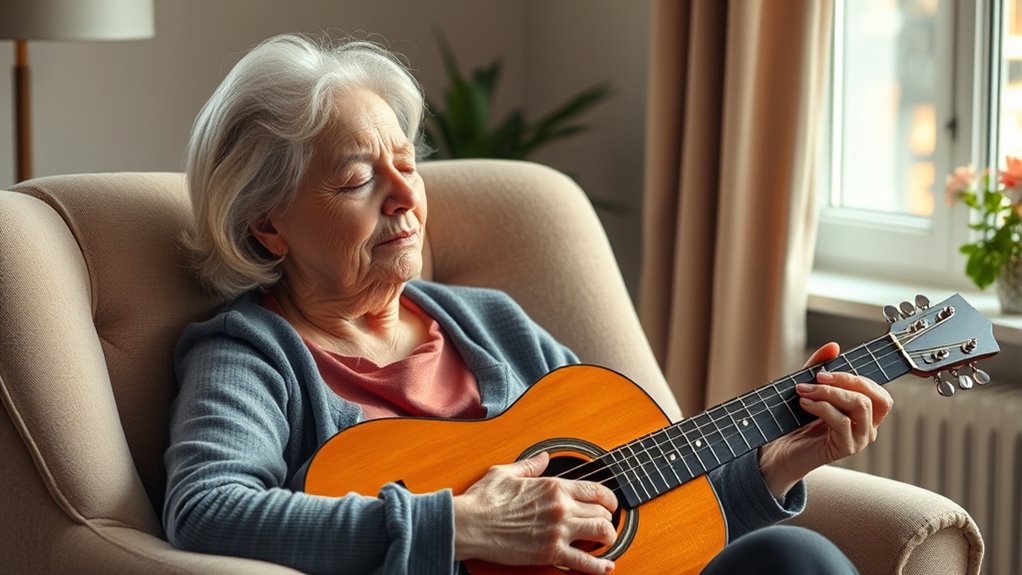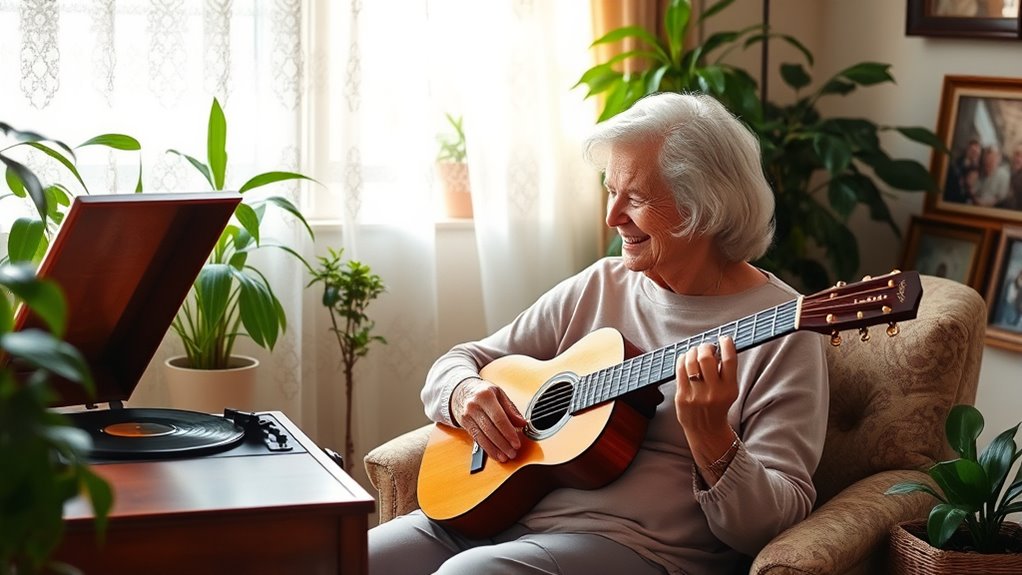Music therapy helps reduce anxiety in older adults by engaging calming brain mechanisms through listening and creating music. It triggers the release of feel-good chemicals and activates mood-related areas, promoting emotional regulation and relaxation. Group sessions and personalized playlists also foster social connection, reduce loneliness, and boost cognitive health. To get the best benefits, choosing qualified providers and incorporating music into daily routines can make a meaningful difference. Keep exploring to discover how to bring these benefits into your life.
Key Takeaways
- Music therapy activates calming brain mechanisms, releasing neurochemicals that reduce anxiety and improve emotional regulation in older adults.
- Group and individualized music interventions foster social connection, emotional expression, and reduce feelings of loneliness among seniors.
- Personalized playlists and routine listening help manage anxiety by creating calming environments tailored to individual preferences.
- Qualified music therapists assess older adults’ needs, ensuring safe, culturally sensitive, and effective anxiety reduction strategies.
- Beyond anxiety relief, music therapy enhances cognitive function, memory, and overall well-being in older populations.
Understanding Anxiety in Older Adults

What exactly causes anxiety in older adults? Several causative factors contribute, including health issues, cognitive decline, and life changes like loss of loved ones or retirement. Additionally, medication effects often play a significant role. Many medications prescribed for chronic conditions can have side effects that heighten anxiety or cause nervousness. Polypharmacy, or using multiple medications, increases this risk. Also, physiological changes with age may impact brain chemistry, making older adults more susceptible. Stress from adjusting to new routines or dealing with health concerns further amplifies anxiety symptoms. Understanding these causative factors helps you recognize that anxiety isn’t just emotional but often rooted in biological and medication-related influences, emphasizing the importance of extensive care in addressing mental health in older adults. For example, medication effects can significantly contribute to anxiety symptoms, highlighting the need for careful medication management.
How Music Therapy Works to Alleviate Anxiety

Music therapy helps reduce anxiety in older adults by engaging the brain’s natural calming mechanisms. When you listen to or create music, it triggers neurochemical effects that promote relaxation, such as releasing endorphins and reducing stress hormones like cortisol. These changes help balance your emotional regulation, making it easier to manage feelings of anxiety. The rhythmic patterns and melodies influence brain regions involved in mood and emotional control, helping you shift from distress to calmness. By stimulating these neurochemical responses, music therapy supports your ability to process emotions more effectively. This active engagement with music creates a soothing environment, allowing your nervous system to reset and lowering overall anxiety levels. Additionally, music can activate relaxation responses, which further enhances its calming effects. Ultimately, this process helps you feel more relaxed and emotionally balanced.
Types of Music Therapy Interventions Available

There are several effective music therapy interventions available to help older adults manage anxiety. Group therapy sessions are common, allowing participants to share experiences and build community through guided musical activities. These sessions often involve singing, listening, or playing instruments together, fostering social connection and emotional expression. Musical improvisation is another powerful intervention, where you create spontaneous music, helping you express feelings and reduce tension in real time. This active engagement encourages emotional release and mindfulness, providing a sense of control and calm. Both approaches are tailored to individual needs and can be adapted for different comfort levels, making them accessible options for older adults seeking relief from anxiety. Additionally, understanding the divorce process can help older adults navigate major life changes that may contribute to anxiety, and music therapy can support emotional resilience during such transitions.
Benefits of Music Therapy Beyond Anxiety Reduction

Music therapy can do more than just reduce anxiety; it also helps boost your cognitive skills and memory. It encourages social interaction, giving you opportunities to connect with others. Exploring these benefits shows how music can enhance your overall well-being. Additionally, engaging with music has been shown to support cognitive health, which is especially beneficial for older adults.
Enhanced Cognitive Function
Engaging in music therapy can notably boost cognitive functions in older adults beyond just alleviating anxiety. It stimulates brain plasticity, helping the brain form new connections and adapt to changes. This process enhances overall mental agility and resilience. Music therapy also promotes memory enhancement by activating areas of the brain responsible for storing and retrieving information. Listening to or creating music engages multiple cognitive pathways, strengthening neural networks involved in attention, executive function, and problem-solving. These improvements can lead to sharper focus and better mental clarity. Additionally, the use of brain plasticity in music therapy can facilitate the recovery of cognitive abilities affected by aging or neurological conditions. By fostering brain adaptability and supporting memory, music therapy offers a powerful tool for maintaining cognitive health in aging, providing benefits that extend well beyond anxiety relief and enriching daily life.
Social Engagement Opportunities
Participating in music therapy sessions creates valuable opportunities for social interaction among older adults. Group singing encourages participants to work together, fostering a sense of community and belonging. It helps break down social barriers and promotes communication. Musical reminiscing allows individuals to share personal stories related to specific songs or genres, strengthening social bonds and encouraging dialogue. These activities provide a supportive environment where seniors can connect through shared experiences and memories. Engaging in collective musical activities enhances feelings of inclusion and boosts morale. Social engagement through music also reduces feelings of loneliness and isolation, which are common in older populations. Overall, music therapy offers meaningful ways to build relationships, making life more joyful and connected beyond its benefits for anxiety reduction.
Implementing Music Therapy in Daily Life

You can easily incorporate music into your daily routine by setting aside time for regular listening. Creating personalized playlists guarantees you have your favorite calming songs ready whenever you need them. Small, consistent steps like these can make a meaningful difference in managing anxiety. Additionally, exploring different genres and styles, such as best anime movies, can introduce new calming sounds to enhance your experience.
Incorporate Daily Listening
Incorporating daily listening into your routine offers a simple yet effective way to enhance the benefits of music therapy for managing anxiety in older adults. To maximize its impact, consider your music genre preferences and select calming genres like classical, jazz, or soft acoustic tunes. Establish consistent daily listening routines, such as during morning coffee or before bedtime, to create a calming ritual. Keep the environment quiet and comfortable, free from distractions, to fully immerse yourself in the music. Regularly engaging in this practice helps lower stress levels and promotes relaxation. Over time, these small daily habits can considerably reduce anxiety and improve overall well-being. Remember, consistent routines and choosing music you enjoy are key to making daily listening a helpful part of your anxiety management plan.
Create Personalized Playlists
Creating personalized playlists can markedly enhance the effectiveness of music therapy by ensuring the music resonates emotionally and psychologically. You should consider your music preferences carefully, selecting songs that evoke positive memories or feelings of calm. Playlist customization allows you to tailor your listening experience, making it more meaningful and relaxing. Think about including soothing melodies, gentle rhythms, or familiar tunes that bring comfort. Regularly updating your playlists keeps the experience fresh and engaging, preventing boredom and maintaining relaxation. When designing your playlist, focus on songs that promote tranquility and reduce anxiety. By aligning your choices with your personal tastes and needs, you create a powerful tool for managing stress and fostering emotional well-being in daily life. Additionally, paying attention to pinball machine weight can be a helpful analogy for understanding the importance of selecting equipment that is manageable and suited to your environment, ensuring a safe and comfortable experience.
Choosing Qualified Music Therapy Providers

Choosing a qualified music therapy provider is essential to ensuring safe and effective treatment for anxiety in older adults. You want someone with verified credentials and proven provider experience. To assess suitability, consider these factors:
| Credential Verification | Provider Experience | Specialization in Older Adults |
|---|---|---|
| Check for valid certifications | Years working with seniors | Familiarity with anxiety issues |
| Confirm licensing | Track record of successful therapy | Knowledge of age-related health needs |
| Membership in professional organizations | Continuing education | Ability to adapt therapy to individual needs |
| Certification in music therapy | Client testimonials | Communication skills |
This table helps you focus on credentials, experience, and specialization, ensuring you select a provider who can deliver safe, personalized care. Additionally, understanding the importance of Cultural Intelligence can help providers better connect with diverse older adult populations and tailor therapy approaches effectively.
Frequently Asked Questions
Can Music Therapy Replace Medication for Anxiety in Older Adults?
You might wonder if alternative treatments can replace medication for anxiety. While holistic approaches like music therapy offer valuable support, they often work best alongside traditional treatments rather than replacing them entirely. Music therapy can reduce anxiety symptoms and improve well-being, but it’s not a all-encompassing solution. Always consult healthcare professionals to develop a thorough plan that combines medication with complementary therapies tailored to your needs.
How Long Does It Typically Take to See Results From Music Therapy?
Research shows that about 70% of clients notice improvements within 4 to 8 sessions. The therapy duration varies based on individual needs, but consistent attendance is key. You should watch for progress indicators like reduced anxiety levels and improved mood. Typically, you might see results after a few weeks, but full benefits often develop over several months. Stay committed, and you’ll likely notice positive changes in your well-being.
Are There Any Risks or Side Effects Associated With Music Therapy?
You might wonder if there are risks or side effects with music therapy. Generally, it’s safe, but potential adverse reactions include emotional distress or discomfort if certain music triggers memories or feelings. Contraindication considerations involve avoiding therapy if someone has severe hearing issues or specific psychological conditions. Always consult with a healthcare professional to confirm it’s appropriate for you and to address any concerns about potential risks.
Is Music Therapy Suitable for Older Adults With Cognitive Impairments?
You might wonder if music therapy suits older adults with cognitive impairments. It can be highly beneficial, as it promotes cognitive engagement and encourages emotional expression. You’ll find that tailored sessions help stimulate memory and communication, making it accessible even with cognitive challenges. Overall, music therapy offers a safe, enjoyable way for older adults to connect emotionally and stay mentally active, supporting their well-being effectively.
How Can Family Members Support Music Therapy Efforts at Home?
You can support music therapy efforts at home by actively involving your family. Encourage family involvement by participating in sessions or creating playlists tailored to your loved one’s preferences. This helps reinforce the therapy’s benefits and provides comfort. Making personalized playlists with familiar songs boosts engagement and emotional connection. Your support and participation make a significant difference, helping your loved one experience the full benefits of music therapy in a familiar, loving environment.
Conclusion
Embracing music therapy is like opening a gentle garden gate, allowing your mind to bloom anew amid the chaos of anxiety. As melodies weave through your days, they can become a soothing river, carrying you toward calm and clarity. Trust in the harmony of trained professionals and the rhythms you cherish, and watch how your worries gradually dissolve like shadows at dawn. With each note, you’re composing a brighter, more peaceful chapter in your life.









